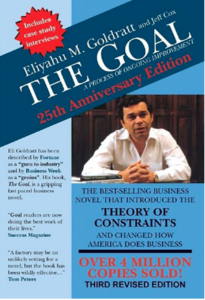Why lawyers must escape the gravitational pull of specialisation
Ken Grady argues why lawyers must escape the gravitational pull of specialisation. And he does so convincingly in this post.
In his argument, Ken cites evidence of why ‘expert-generalist’ or ‘T-shaped’ people innovate more successfully than those with a narrow focus. In the case of legal services, Ken suggests this is because lawyers have become super-specialized over the last four or five decades.
 As always, Ken is thought-provoking.
As always, Ken is thought-provoking.
Add to his argument, the risk-averse nature of lawyers, their partnership structures in private practice and the lack of real equity on their balance sheets and the dilemma is (largely) explained. This leaves the door open for NewLaw, law company and other operators who have none of the constraints.
All this reminds me of The Goal, the novel by Eliyahu Goldratt first published in 1984, and revised and republished. The Goal expounds the Theory of Constraints and bottlenecks, and how to alleviate them. Here’s a great summary by James Clear.
George


Make no mistake, I love Ken’s writing and his insight, but on this one I guess we will have to agree to disagree.
And I’m frankly surprised that he is anti-specialization given that he is himself the widely known specialist in legal lean. So is it okay for consultants to specialize, but not lawyers?
No there’s no real problem with being a generalist, as long as you occupy some profession where data and knowledge are not growing exponentially. Anyone know of such a profession? Let’s just look at medicine. There are over 8000 peer-reviewed medical journal articles being published . . . daily!
Now pick any industry and the experts will tell you about how the total amount of data in that industry is doubling at a rate of 1.2 years.
I could go on at great length, but I will leave that for another day. Meanwhile, good luck to those who think they can sit back and not become super-specialists in a couple of chosen niche areas where they can be seen as the ‘go to expert’ . . . like Ken has managed to do in legal lean.
Patrick, I read Ken differently. Those with their heads buried deep in the specialized sand caring for their clients, miss what’s happening on the surface and coming over the horizon.
This is true in all specializations, e.g. the knee joint replacement surgeons who haven’t seen stem cell therapy eventually replacing most, but not all, of them and the cardiologists who don’t accept that ECG telemetry using smartphones and virtual advice are going to replace the majority, but not all, of patients’ visits to the consulting room.
Saying this is not anti-specialization. Who would want a family physician, aka a generalist, to implant a prosthetic knee or a pace-cardiac pace-maker? Ken argues (and so do I) that T-shaped orthopaedic surgeons and cardiologists are much more likely to innovate than those who think only about the next generation of prosthetic materials and pace-maker designs.
T-shaped lawyers, surgeons, and cardiologist are more likely to remain sustainably relevant – and prosperous – than narrow their specialist peers. It’s the AND, not OR, challenge of our times.
I’m with you George. I spent nearly 20 years as a partner in one of the very large firms where specialisation and silos were the norm – and yes this was driven by the billable hour. I am now at a much smaller firm where we embrace the idea of having T-shaped expertise. Not only does this allow us to see beyond our narrow area of practice and identify opportunities for innovation, it allows us to more properly engage with and respond to our client’s needs, because we are more able to identify those needs.
Hi George, I agree with your point that, as Jim Collins is so fond of saying, it is an “and” not “or.” Now, let’s do go back to square one and note that this entire conversation is driven by the question, “why don’t large law firms innovate?” I’m a simple evidence-based inquirer. I’d love to have someone show me the evidence that large law firms don’t innovate. Show me the proof! It does not show up in the surveys over the years that have recognized the top FT Innovative Law Firms or those who have won “InnovAction” awards. And I have just finished helping recruit the speakers and will be Chairing a major Conference at the Suffolk Law School on Innovation later this year, wherein we searched high and low for those law firms doing anything innovative and could only, for the most part, identify innovation in the larger firms. So while it sounds provocative, where does this notion originate? And then we gravitate to a “theory” on innovation and the hypothesis that it is because of professionals being too specialized and needing to be more “T-shaped.” And, again, I would love to have someone show me concrete evidence that… Read more »